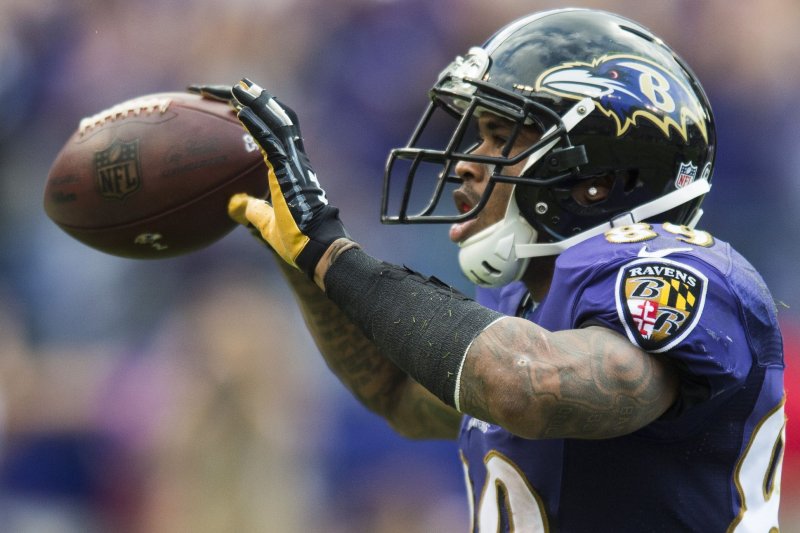Former Baltimore Ravens wide receiver Steve Smith Sr. played in the NFL for 16 seasons. File photo by Pete Marovich/UPI |
License Photo
Aug. 7 (UPI) -- Retired NFL receiver Steve Smith opened up about his battle with depression Tuesday in an article for NFL.com.
The five-time Pro Bowl selection and two-time All-Pro played 16 seasons for the Carolina Panthers and Baltimore Ravens before retiring after the 2016 season.
Smith began his article by talking about the recent suicides of Kate Spade and Anthony Bourdain. He then referenced Brian Dawkins' enshrinement speech on Saturday at the Pro Football Hall of Fame. The Philadelphia Eagles legend detailed his personal battle with depression and how he overcame it.
"There's hope. There is something on the other side of this. Don't stay where you are. Keep moving. Keep pushing through," Dawkins said in the speech.
Smith said he first stepped into a counseling session in 2002.
"It's crucial for everyone to know that acknowledging personal struggles isn't a sign of weakness, but one of strength," Smith wrote. "Too often taboo, depression is shut behind closed doors -- especially in a tough-guy sport like football, with a social media environment that glorifies successes and status."
Smith said he took ownership of his personal journey with depression after he retired.
"I was able to retain what helped me reach my peak performance and able to get in the zone, shutting out the noise and negative thoughts on the field," Smith wrote. "I did that with flying colors, but I wasn't able to grasp that concept in my life outside of the game. I couldn't quiet the noise and negative thoughts in my mind. It wasn't until I stepped away from the game at the end of the 2016 NFL season that I really began to take ownership and understand my personal journey with depression."
Smith said that despite his success on the field, he never "truly enjoyed those moments."
"Despite all of my achievements, I routinely felt trapped, inferior and alone," he wrote. "This overwhelmed me internally and often left me mentally, physically and emotionally broken."
Smith also cited specific instances when he felt the depression.
He said that he felt depressed following the Panthers' victory in the 2003 NFC Championship because he didn't perform well, despite the team clinching an appearance in the Super Bowl.
"Generally, throughout much of my life, unhappiness, constant self-criticism and an inability to let old blunders go weighed so heavily on my mind," Smith wrote. "I can recall hundreds of these moments, on and off the gridiron, when I felt inept. It really took a toll on my mental state."
Smith also said in 2013 he was overwhelmed to a point where he didn't know what to do or how to handle his emotions. He also tried counseling that year for "non-football related matters." He had the counselor meet him at his home so that other people couldn't see him walking into a session into a public setting.
He said he continued the sessions through his arrival in Baltimore. Smith said he now finally feels "free," but being in public is still a "constant struggle."
Former Baltimore Ravens wide receiver Steve Smith Sr. walks across the field to greet some Carolina Panthers players in 2014 at M&T Bank Stadium in Baltimore, Md. File photo by Pete Marovich/UPI
Smith ended his article by answering the question: "What's wrong with me?"
"There's nothing wrong with me, nor is there with anyone else who suffers from depression and other mental health disorders," Smith wrote. "All human beings have strengths and weaknesses, physical and mental. You're defined by how you play the hand you're dealt in life. I've spent the last year grieving, in a sense, the fact that I no longer am a football player -- the one thing I have been my entire life. Reidentifying myself has been quite the process and learning to be OK with that even more so."
He also advised others suffering with mental health issues to ask for help and stop trying to deal with the matters alone.
The 2005 Comeback Player of the Year ranks No. 8 all-time in receiving yards, No. 12 in receptions and No. 26 in touchdown receptions. Smith now serves as an analyst for NFL Network.
















